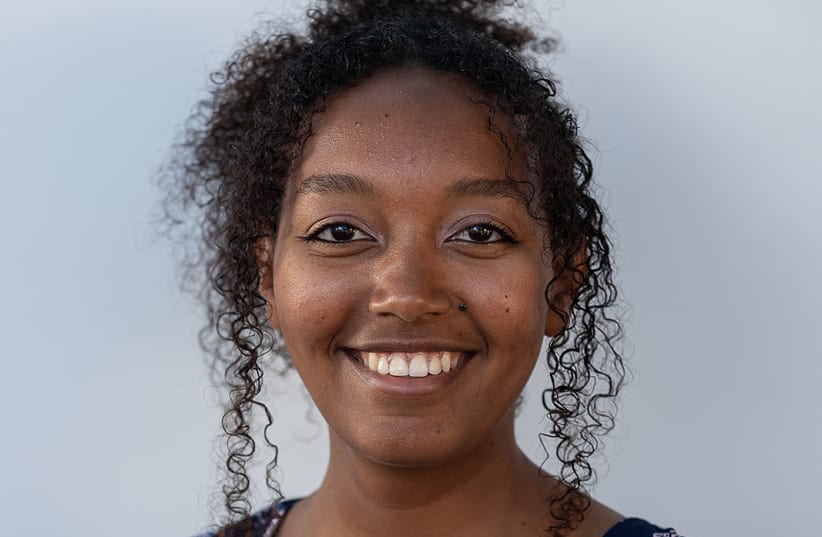Ingoday Haile is a strong, smart, charming woman who is confident in her identity as an Ethiopian-Israeli. Yet her family’s aliyah story was far from easy.
She was born in the mountainous Gondar region of Ethiopia. When she was eight months old, her mother and father walked from their village to Addis Ababa with her, her older brother and three older sisters.
Their dream was to make aliyah. They waited four long years in temporary housing until they were finally able to realize this dream. Haile was five.
She vaguely remembers the absorption center in Safed where the family first settled. What she clearly remembers is the difficulty her parents had in adjusting to life in Israel.
“It was a new language, a new culture and a completely new way of life,” says Haile. “My parents did not have the ability to deal with this at the beginning.
“But my father was a determined man and knew that he wanted us to live in Jerusalem. Two years later, he miraculously made this happen,” she continues.
Moving to Jerusalem
Living in Jerusalem was magical for the family, despite her parents’ difficulty in finding work. Both her parents worked as cleaners, as did many Ethiopians, and Haile found this very sad. One of her older sisters is now a social activist working to advance the community, and her other sister, who was a shepherd in Ethiopia, is now a nurse at one of the country’s largest hospitals.
“The Ethiopian adults came with many skills that were not applicable here. As a result, they worked in minimum wage jobs. They had the potential to be so much more.”
Ingoday Haile
“The Ethiopian adults came with many skills that were not applicable here. As a result, they worked in minimum wage jobs. They had the potential to be so much more,” she says.
Eventually, her father was accepted to a jewelry-making program for Ethiopian newcomers at the Yvel Jewelry Design Center in Jerusalem. The Megemeria School of Jewelry and Art (megameria means “genesis” in Amharic) creates new designs in traditional Ethiopian jewelry and is operated by members of the community. Ingoday’s father is now a respected jewelry maker.
He is the family’s sole supporter. Her mother was a homemaker and invested everything in her family.
Growing up in Israel
Haile was a bright, inquisitive child and integrated quickly into second grade. She loved to learn and she internalized her family’s values of education and excellence. Throughout middle and high school, she loved both the exact sciences and behavioral sciences and took two electives in high school – chemistry and sociology/psychology. She graduated with highest honors.
Like most Israeli citizens, Haile did her mandatory army service after high school. She served in the air force, where she was stationed in the far North guarding the base on the ground. With Syria and Lebanon only a stone’s throw away, this was a key position.
“I managed intense and stressful security situations, as well as training new operatives,” she explains. “This gave me a lot of responsibility and a great sense of resilience and achievement. I also made wonderful friends with the people in my unit, who I am still very close with.”
Rather than taking off for the Far East or South America as many do after the army, she walked the breadth and width of the land on the Israel Trail, from Kibbutz Dan in the North to Mitzpe Ramon in the South.
She then went to live in the Golan Heights for seven months, where she participated in an agricultural program.
“We have an incredible land with wonderful people,” she says, “and I was so pleased to see and feel the beauty of my country.”
While working in agriculture, going to university was on her mind, and Haile returned home to begin studying for her entrance exams. This was during the pandemic, so finding a job was difficult. Haile worked different gig jobs to save for her education.
She wanted to be a materials engineer, a multidisciplinary field that combines engineering and the exact sciences, which is gaining momentum across diverse industries.
She chose Ben-Gurion University of the Negev for a number of reasons. The most important being that after 20 years of waiting in Ethiopia, her grandparents were finally given permission to make aliyah, and they were living in the absorption center in Beersheba.
“I wanted to be near them and to help them acclimate,” she says. “I also wanted to go to a new place where I would have new experiences in a city that I had never been to. And Ben-Gurion University has an excellent materials engineering faculty.”
Haile knew that her parents would not be able to help her financially, so she began looking for different scholarships and assistance programs. When her cousin told her about Atidim’s Step-UP program for bright young women from the periphery and vulnerable communities, she thought it was too good to be true.
“Step-UP empowers females to get their engineering degrees and then helps them to integrate into hi-tech and industry,” she says. “I receive tuition, living expenses, tutoring, high-end online tutorials, academic counseling, job preparedness workshops and even a laptop computer.
“I feel that someone has my back and that they really care about me and my success. This has given me the freedom to invest in my intensive studies without having to worry all the time about financial survival,” she explains.
Haile is now beginning her sophomore year, and says the Step-UP activities throughout her freshman year left her feeling inspired and energized, even when her courses were really difficult. She is looking forward to these activities next year.
At an event with Step-UP students and women engineers from SolarEdge, a world leader in smart-energy solutions, Haile heard amazing stories of how women with backgrounds very similar to hers made it to the top of hi-tech.
“These women were such role models, and through this event we created a network of connections that I know will be important for my future.”
Haile hopes that one day there won’t be a need for a program like Step-UP because everyone, no matter where they are from or what socioeconomic circumstances they were born into, will have equal opportunity to realize their potential and follow their dreams. ■
Ingoday Haile, 24: From Ethiopia to Jerusalem, 2003

